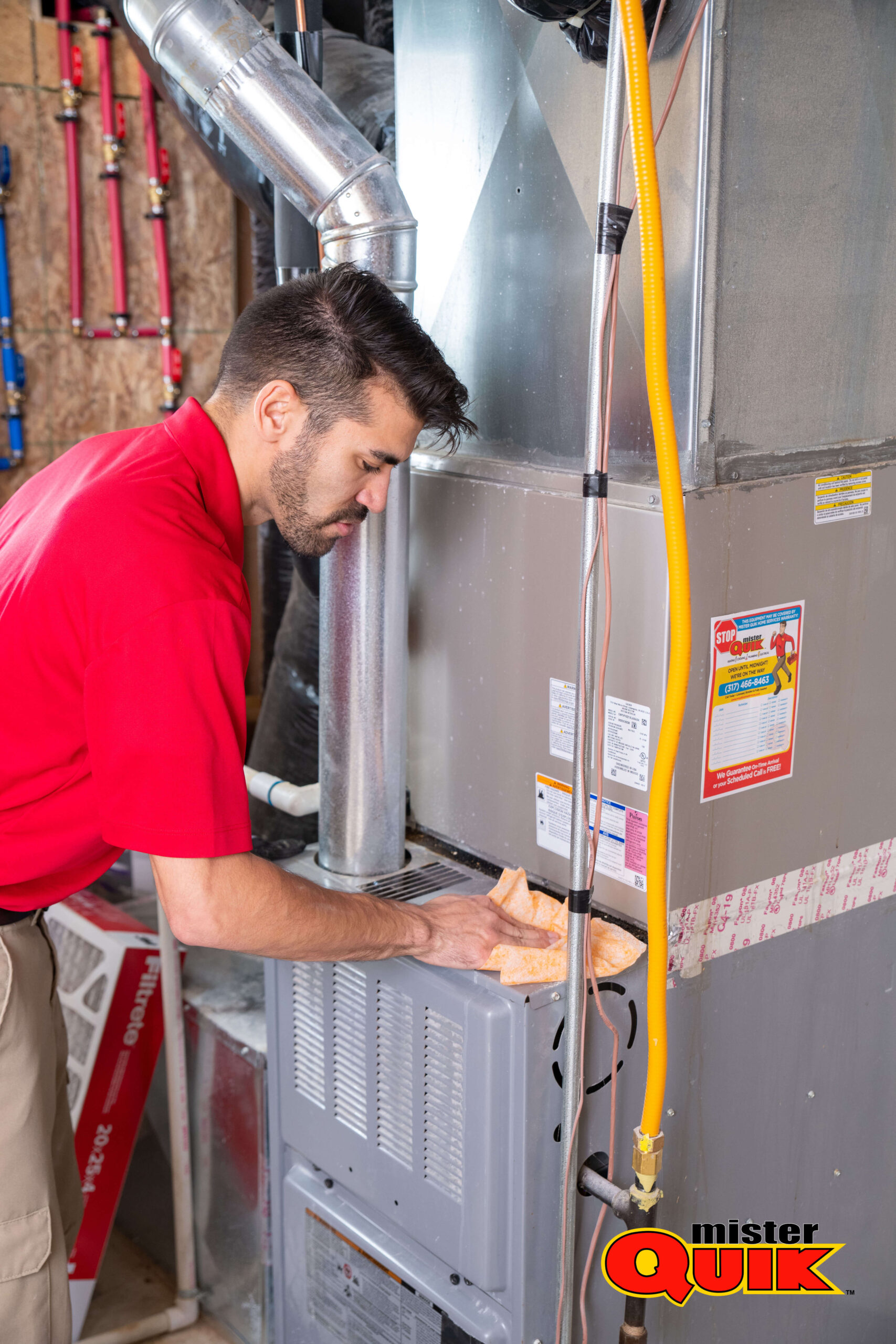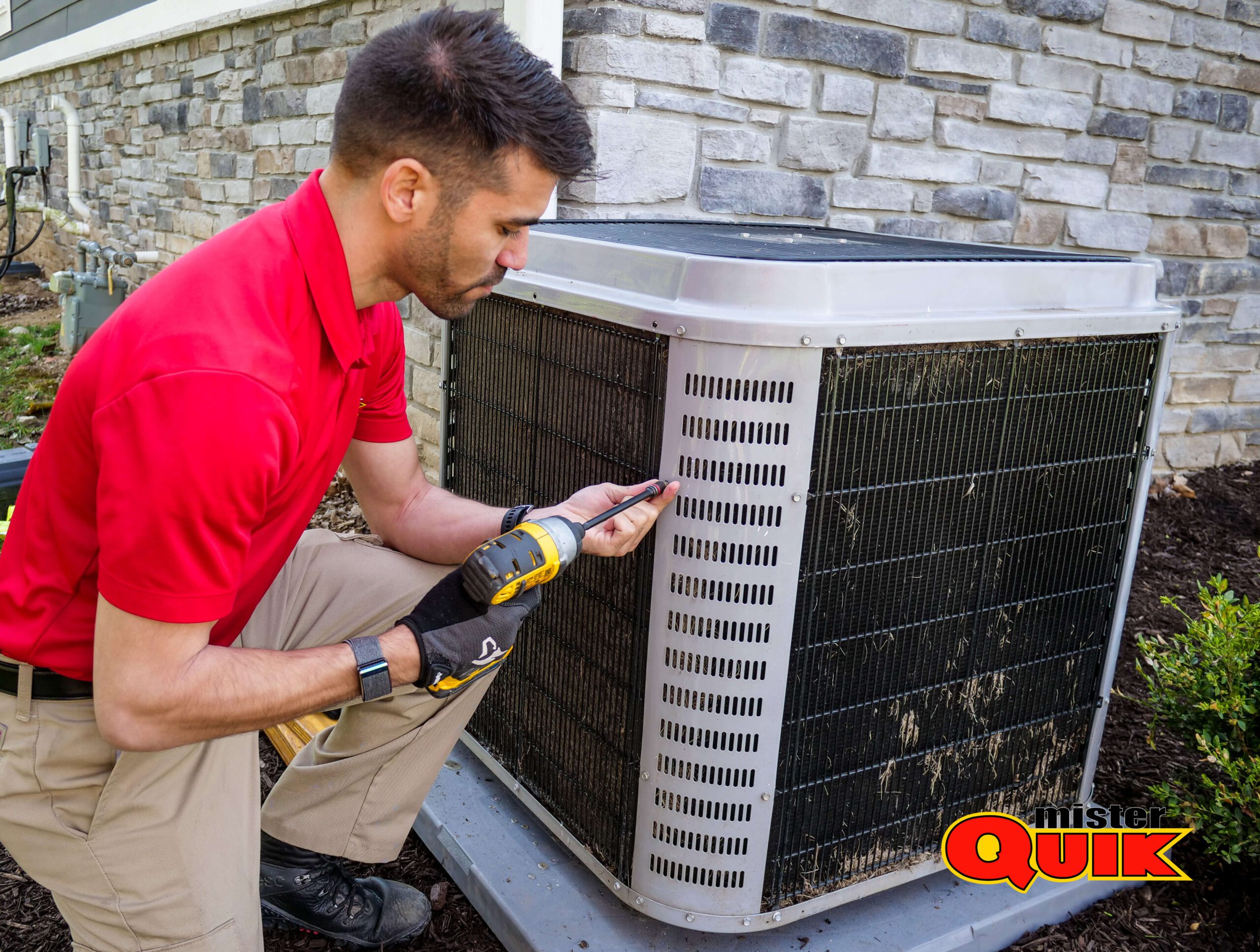Indianapolis Air Handler Services
Schedule on your own without making a call. Click the button below to get started!

What is an Air Handler?
An Indianapolis air handler is a crucial part of your home’s heating and cooling system. It’s responsible for circulating air throughout your home, helping to keep you comfortable year-round.
- 1. Air Circulation: The air handler’s primary function is to circulate conditioned air throughout your home. It pulls air from inside your home, passes it through the heating or cooling system, and then distributes it back into your living spaces through ductwork.
- 2. Temperature Regulation: By passing air through the heating or cooling system, an Indianapolis air handler helps regulate the temperature inside your home. In the winter, it distributes warm air generated by the furnace or heat pump, while in the summer, it circulates cool air produced by the air conditioner.
- 3. Air Filtration: Many air handlers come equipped with filters that help remove dust, pollen, and other airborne particles from the air as it passes through the system. This helps improve indoor air quality and can reduce allergens in your home.
- 4. Humidity Control: Some air handlers include features for controlling humidity levels in your home. By removing excess moisture from the air during the summer months, or adding moisture during the winter, these systems can help maintain a comfortable indoor environment.
- 5. Customization Options: Indianapolis Air handlers come in a variety of sizes and configurations to suit different heating and cooling needs. Whether you have a small apartment or a large family home, there’s an air handler available to meet your specific requirements.
Overall, an air handler plays a crucial role in keeping your home comfortable and healthy. By circulating air, regulating temperature, filtering out impurities, and controlling humidity, it helps create a pleasant indoor environment for you and your family.
Types of Indianapolis Air Handlers
When it comes to Indianapolis air handlers, there are several types to choose from, each offering unique features and benefits to suit your home’s specific needs. Here are some options to consider:
These are the most common type of air handlers and operate at a fixed speed. They provide consistent airflow but may be less energy-efficient compared to variable-speed models.
These air handlers adjust their speed based on the heating or cooling demands of your home. They can operate at various speeds, allowing for precise temperature control and increased energy efficiency.
Similar to variable-speed models, modulating air handlers offer even greater precision in temperature control. They continuously adjust their speed and airflow to maintain a consistent indoor climate, making them ideal for homes with fluctuating temperature requirements.
These units are designed to be installed horizontally, making them suitable for attic or crawl space installations where vertical space is limited.
Vertical air handlers are installed upright and are commonly used in basements, closets, or mechanical rooms where there is ample vertical space.
These air handlers are installed above the ceiling, making them ideal for homes with limited floor space. They provide efficient heating and cooling without taking up valuable room.
These air handlers are part of ductless mini-split systems and are mounted directly in the rooms they serve. They offer targeted heating and cooling for individual areas of your home, providing flexibility and energy savings.
In general, most HVAC systems will last 10 to 15 years, but depending on the type of system and other contributing factors, that estimate can be highly variable.
Your air handler may run quite frequently during the months where Indiana experiences the most extreme temperatures. Occasionally this could result in your heat pump freezing over. To help mitigate any unnecessary heating or cooling, look into a programmable or smart thermostat, which will allow you to customize your heating and cooling times.
If air isn’t circulating properly inside your home or you notice hot and cold spots in some of your rooms, the fan might not be working at all. The fan could also be making strange noises, which indicates that something is wrong and your air handler needs to be inspected. Blower motor failure.
The difference between a furnace and an air handler is that a furnace creates heat while an air handler moves air. They are two different pieces of HVAC equipment.
While you can do this, it is not recommended. HVAC systems are more complicated than you might think. There are many things that can go wrong during the installation if you aren’t a professional.
What Differentiates Air Handlers from Traditional Air Conditioners?
Indianapolis Air handlers and traditional air conditioners serve similar purposes in cooling your home, but they have distinct differences in how they operate.

- Air Handlers: Indianapolis Air handlers are an integral part of your HVAC system, responsible for circulating conditioned air throughout your home. They work in conjunction with other HVAC components, such as furnaces or heat pumps, to distribute both cooled and heated air.
- Traditional Air Conditioners: Traditional air conditioners function as standalone units designed solely for cooling purposes.
- Air Handlers: Typically installed indoors, Indianapolis air handlers are located in attics, closets, or basements. They are connected to ductwork that carries conditioned air to different rooms in your home.
- Traditional Air Conditioners: Installed outdoors, traditional air conditioners consist of an outdoor condenser unit that houses the compressor and condenser coil.
- Air Handlers: Air handlers offer versatility in heating and cooling options. They can be paired with various heating sources, including furnaces, heat pumps, or boilers, providing customizable comfort solutions tailored to your needs.
- Traditional Air Conditioners: While effective at cooling, traditional air conditioners do not provide heating capabilities. They solely focus on cooling indoor air during hot weather.
- Air Handlers: Some Indianapolis air handler models feature variable-speed or modulating capabilities, allowing them to adjust their speed and airflow to match your home’s heating and cooling demands efficiently.
- Traditional Air Conditioners: Traditional air conditioners also come in energy-efficient models.
- Air Handlers: Indianapolis Air handlers may have a higher upfront cost due to their integration into a complete HVAC system. However, they offer long-term energy savings and customizable comfort solutions.
- Traditional Air Conditioners: Traditional air conditioners typically have a lower upfront cost but may result in higher energy bills over time due to their limited efficiency and functionality.
Air Handler Installation In Indianapolis
In Indianapolis, the climate is characterized by extreme temperature variations, with scorching hot summers and cold winters, necessitating the need for a dependable heating and cooling system year-round. During the sweltering summer months, temperatures often soar to uncomfortable levels, while in the winter, frigid temperatures can plummet below freezing, posing challenges to maintaining indoor comfort. In such a climatic setting, having a reliable HVAC system is paramount to ensure that your home remains comfortable regardless of the outdoor weather conditions. This is where an Indianapolis air handler plays a crucial role.

An Indianapolis air handler serves as a versatile component of your HVAC system, seamlessly integrating with existing heating and cooling equipment to effectively regulate indoor temperatures. Regardless of whether it's blistering hot outside or bitterly cold, the air handler efficiently circulates conditioned air throughout your home, ensuring consistent comfort levels in every room. During the summer, the air handler works in tandem with the air conditioner to cool and dehumidify the indoor air, keeping it refreshing and comfortable. Conversely, in the winter, the air handler collaborates with the furnace or heat pump to distribute warm air evenly, ensuring cozy and inviting indoor spaces.
The adaptability of an air handler to fluctuating weather conditions makes it an indispensable asset for homeowners in Indianapolis. Its ability to maintain comfort, improve indoor air quality, and enhance energy efficiency regardless of the outdoor climate underscores its significance in ensuring a pleasant living environment year-round. With an air handler in place, you can enjoy peace of mind knowing that your home will remain a comfortable oasis, shielding you from the extremes of Indianapolis weather.
Schedule Air Conditioning & Heating Services in Indianapolis
If you need quick air conditioning and heating repairs in Indianapolis, Mister Quik Home Services has got you covered. We understand the importance of having a reliable HVAC system, especially when extreme weather hits.
Our team of skilled technicians is ready to provide prompt repairs for all your air handler needs. Whether your air handler is blowing hot air, making strange noises, or not turning on at all, we’re here to help.
When you schedule air conditioning and heating services with us, you can expect:
1. Fast Response
If your energy bills have been steadily increasing over the past few years, it may be because your heater is working harder than it needs to in order to keep your home warm.
2. Expert Diagnosis
If you constantly have to call for repairs on your heater, it’s probably time to replace it.
3. Efficient Repairs
With our expertise and fully stocked service vehicles, we’re equipped to handle repairs efficiently. We’ll work swiftly to fix your air handler and restore it to optimal performance.
4. Transparent Communication
We believe in clear communication with our customers. Our technicians will explain the issue with your air handler in simple terms and provide upfront pricing for any necessary repairs.
5. Quality Guarantee
At Mister Quik Home Services, we stand behind the quality of our work. We’re committed to your satisfaction and guarantee our repair services to ensure peace of mind.
Don’t let a malfunctioning air handler disrupt your comfort. Contact Mister Quik Home Services today to schedule air conditioning and heating services, and let us take care of your HVAC repair needs with speed and expertise.
Signs Your Indianapolis Air Handler Needs Replacing
Knowing when it’s time to replace your air handler is important for maintaining a comfortable and efficient home environment. Here are some signs that indicate your air handler may need replacing:
If your air handler is more than 10-15 years old, it may be nearing the end of its lifespan. Older air handlers are more prone to breakdowns and may not operate as efficiently as newer models.
If you find yourself constantly repairing your air handler or if the repair costs are becoming increasingly expensive, it may be more cost-effective to replace the unit altogether.
An inefficient Indianapolis air handler can result in higher energy bills and reduced comfort levels in your home. If you notice that your energy bills are consistently increasing or if certain rooms in your home are consistently too hot or too cold, it could be a sign that your air handler is struggling to keep up.
Unusual noises such as banging, clanging, or grinding coming from your air handler could indicate mechanical issues that warrant replacement.
If you notice an increase in dust, allergens, or indoor air pollutants despite regularly changing your air filters, it could indicate that your air handler is no longer effectively filtering the air.
If you notice any of these signs, it’s essential to consult with a professional HVAC technician to assess the condition of your air handler and determine if replacement is necessary. Investing in a new air handler can improve indoor comfort, reduce energy costs, and enhance overall system performance.
Air Handler Home Troubleshoot Checklist:
- Ensure air vents are not blocked or obstructed.
- Verify that the air handler’s blower fan is functioning correctly.
- Monitor indoor humidity levels using a hygrometer.
- Verify that the air handler’s humidification or dehumidification features are functioning as expected.
- Adjust thermostat settings to confirm proper operation.
- Check for any unusual fluctuations in indoor temperature.
- Consult with an HVAC technician to assess the suitability of the air handler for your home’s size and layout.
- Consider upgrading to a variable-speed or modulating air handler for enhanced comfort and energy efficiency.
- Clean or replace air filters to maintain optimal airflow.
- Ensure air filters are installed correctly and not clogged with debris.








